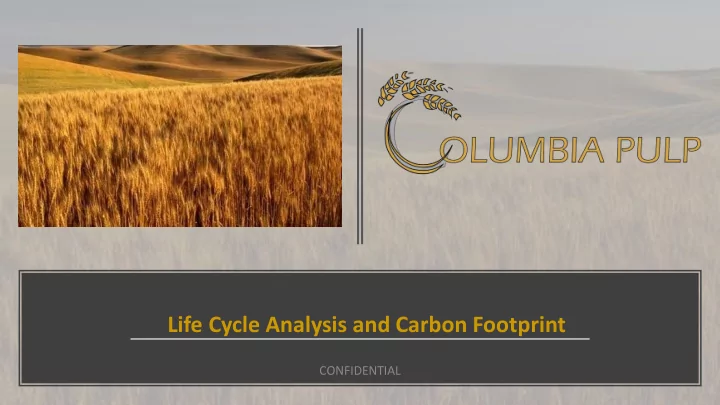

Life Cycle Analysis and Carbon Footprint CONFIDENTIAL
BACKGROUND • Columbia Pulp commissioned Environmental Packaging International (EPI) and Intertek to produce an independent environmental analysis of cellulose pulp made from wheat straw. • The study used Life Cycle Analysis (LCA) methodology to measure the carbon footprint • The amount of product (functional unit) used in the LCA is 1ADMT (air dry metric ton). CONFIDENTIAL
Environmental Im Impact of f the Columbia Pulp Process ▪ The carbon footprint of Columbia Pulp is 76% lower than the average carbon footprint of conventional pulps due to: ▪ Utilization of an agricultural waste product ▪ Energy efficiency ▪ Minimal water usage ▪ State of the art facility & process CONFIDENTIAL
Environmental Im Impact of f the Columbia Pulp Process • Replacing 140,000 tons of conventional pulp annually, using Columbia Pulp’s product, will result in 133,000 metric tons of CO2 carbon savings per year • This is equivalent to: • The CO2 absorbed by approximately 5.8 million trees each year • The CO2 emitted by approximately 40,000 cars, each driving 10,000 miles per year CONFIDENTIAL
CARBON FOOTPRINT OF COLUMBIA PULP Carbon Footprint is often seen as the most important environmental metric Carbon Unit Columbia air- Conventional Conventional Conventional Footprint dried pulp 1 CTM pulp 1 sulfate pulp 1 sulfite pulp 1 metric ton metric ton metric ton metric ton Global Kg Warming CO2 309 1733 611 1437 Potential eq Columbia Pulp has the lowest carbon footprint by a significant margin within the pulping industry. There are three main reasons: 1. Usage of a genuine waste product (straw left over from wheat farming) 2. Wheat straw is a locally sourced product for our facility, providing a resourceful supply chain 3. Produced in a state of the art new facility, which is more efficient than typical traditional pulping mills CONFIDENTIAL
CARBON FOOTPRINT IN INCLUDING STRAW PRODUCTION In this Life Cycle Analysis (LCA) the straw is counted as a free input, because it is a waste product of wheat production . The inclusion of straw production would not cause a significant change in the LCA results. Global Unit Columbia air Conventional Conventional Conventional Warming dried pulp 1 CTM pulp 1 sulfate pulp 1 sulfite pulp 1 metric ton metric ton metric ton metric ton Including Kg Straw CO2 382 1733 611 1437 eq CONFIDENTIAL
CARBON FOOTPRINT OF COLUMBIA PULP MADE IN INTO PRODUCTS Columbia Conventional Carbon Corrugated Corrugated Columbia Conventional Columbia Conventional Footprint Unit Board Board Tissue Tissue Molded Pulp Molded Pulp Global kgC Warming O2 Potential eq 1352 1606 1344 3164 1438 2062 The carbon footprint of corrugated board made with Columbia Pulp’s product is lower than the carbon footprint of corrugated board made from conventional pulp. This is because the input pulp has a lower carbon footprint, and the other aspects are the same(conversion to board, transport, use and disposal/recycling). The carbon footprint of Columbia Pulp’s tissue is lower than the carbon footprint of conventional tissue and molded pulp for the same reasons. CONFIDENTIAL
WHIC ICH NUMBERS ARE THE BEST ONES TO USE? Columbia Pulp’s LCA used standard methodology in that: • A waste product such as wheat straw counts as a free input. • A carbon credit for not burning something can only be counted if a product locks up the carbon for 100 years or more. Since paper products are likely to last for only a few years, the carbon release is only delayed by a few years, not for over a century. So the credit for not burning straw would not normally be accepted as fair by most LCA experts. • A carbon credit for not burning straw was not taken CONFIDENTIAL
LCA Services provided by IN INTERTEK & EPI Interteck is a leading Total Quality Assurance provider to industries worldwide. Interteck's network consists of more than 1,000 laboratories and offices and over 42,000 people in more than 100 countries. The Intertek Sustainability Team has over 20 years of experience in carbon foot-printing and life cycle assessment to measure the environmental impact of products and processes. Environmental Packaging International was founded in 1998 by Victor Bell, a consultant specializing in environmental compliance, product stewardship, and sustainability issues related to packaging, batteries, electronics and other products. EPI offers a full range of customized regulatory tracking, research and compliance management. CONFIDENTIAL
Recommend
More recommend